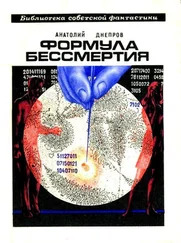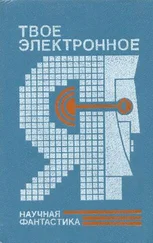Анатолий Днепров - Crabs on the island
Здесь есть возможность читать онлайн «Анатолий Днепров - Crabs on the island» весь текст электронной книги совершенно бесплатно (целиком полную версию без сокращений). В некоторых случаях можно слушать аудио, скачать через торрент в формате fb2 и присутствует краткое содержание. Город: Moscow, Год выпуска: 1968, Издательство: MIR Publishers, Жанр: Фантастика и фэнтези, на английском языке. Описание произведения, (предисловие) а так же отзывы посетителей доступны на портале библиотеки ЛибКат.
- Название:Crabs on the island
- Автор:
- Издательство:MIR Publishers
- Жанр:
- Год:1968
- Город:Moscow
- ISBN:нет данных
- Рейтинг книги:4 / 5. Голосов: 1
-
Избранное:Добавить в избранное
- Отзывы:
-
Ваша оценка:
- 80
- 1
- 2
- 3
- 4
- 5
Crabs on the island: краткое содержание, описание и аннотация
Предлагаем к чтению аннотацию, описание, краткое содержание или предисловие (зависит от того, что написал сам автор книги «Crabs on the island»). Если вы не нашли необходимую информацию о книге — напишите в комментариях, мы постараемся отыскать её.
Crabs on the island — читать онлайн бесплатно полную книгу (весь текст) целиком
Ниже представлен текст книги, разбитый по страницам. Система сохранения места последней прочитанной страницы, позволяет с удобством читать онлайн бесплатно книгу «Crabs on the island», без необходимости каждый раз заново искать на чём Вы остановились. Поставьте закладку, и сможете в любой момент перейти на страницу, на которой закончили чтение.
Интервал:
Закладка:
"But there's no material for silicon batteries in these heaps of metal," I remarked, trying to grasp the technology of this monstrous self-production of machines.
"There's no need. There's plenty of it here."
Cockling clumsily kicked up the sand. "Sand is an oxide of silicon. It is reduced to pure silicon inside the crab by an electric arc."
We returned to the tent in the evening, by which time six robot-crabs were working by the heap of metal and two were warming themselves in the sun.
"What's it all for?" I asked Cookling during supper.
"For war. These crabs are a terrible means of sabotage," he said bluntly.
"I don't get it."
Cookling went on chewing his stewed beef and then, without haste, explained: "Imagine what would happen if these things were secretly introduced into enemy territory."
"Well?" I said, and stopped eating.
"You know what progression means?"
"Of course."
"Yesterday we began with one crab. Now there are eight. Tomorrow there will be sixty-four, the day after tomorrow-five hundred and twelve, and so on. In ten days' time there would be over ten million. And that would require thirty thousand tons of metal."
I was struck dumb when I heard these figures.
"Yes, but…"
"In a short time these crabs could devour all the enemy's metal-all his tanks, guns, and aircrafts. All his machine tools, plant, and equipment. All the metal on his territory. Within a month not a scrap of metal would remain on the face of the earth. It would all have gone to reproduce these crabs. And in wartime, don't forget, metal is the most important strategic material."
"So that's why the Admiralty was so interested in your toy!" I whispered.
"Exactly. But this is only the first model. I'm going to simplify it considerably in order to speed up the process of reproduction. Speed it up two or three times. Make the construction stronger and firmer. Make them more mobile. Increase the sensitivity of the indicators to metal deposits. Then my robots will be more dangerous in wartime than the plague. I want the enemy to be deprived of his metal potential within two or three days."
"Yes, but when they've eaten up all the metal on the enemy's territory, they'll move over to their own," I exclaimed.
"That's another question. We can code their work and knowing this code, stop them working the moment they appear on our territory. And incidentally, we can get hold of the enemy's whole metal supply this way."
All that night I had nightmares. Swarms of metal crabs were crawling over me, their feelers rustling, thin columns of blue smoke rising from their metal bodies.
Within four days the whole island was covered with Cookling's robots.
According to his calculations, there were over four thousand of them now. Shining in the sunlight, they could be seen everywhere. When the metal in one heap came to an end, they began to search all over the island and found others.
Just before sunset on the fifth day I witnessed terrible scene: two crabs fighting over a piece of zinc.
This was on the south side of the island where we had buried a number of zinc bars in the sand.
The crabs working in other parts of the island came here from time to time to make a certain zinc component. It so happened that about a score of crabs had all scuttled at the same time to the zinc cache, and a real scramble resulted. The machines got into each other's way. One crab particularly distinguished itself: it was nimbler than the others and, it seemed to me, stronger and more aggressive.
It pushed its brothers aside and climbed over their backs in its endeavour to get a bit of metal from the bottom of the hole. But just as it was achieving its purpose, another crab seized the same piece with its pincers. The two machines tugged at the bar in opposite directions. Finally, the crab that seemed to me the more agile, tore the bar away from its rival. But the latter, unwilling to give up its prey, came up from behind, got on the robot's back, and thrust its pincers into the other's mouth. The pincers of both twisted together and they began to tear at each other with terrible force.
None of the other machines took the slightest notice of all this; but for these two it was a life and death struggle. I saw the crab that had mounted the other suddenly fell over on its back, belly uppermost while its iron platform slipped down, exposing its metal insides. In a flash its enemy had begun to cut it up with a rapid succession of electric sparks. When the victim's body finally broke into pieces, the conqueror started tearing out levers, gear wheels and wires, and shoving them quickly into its mouth.
As the components thus acquired entered the body of the predator, its platform began to move out rapidly and the feverish assembly of a new machine began on it.
Some minutes later, a new crab had fallen from the platform on to the sand.
When I told Cookling what I had seen, he just chuckled.
"That's exactly what I wanted," he said.
"Why?"
"Surely I told you I want to improve my robots."
"Well, so what? Take your blue prints and work out how to do it. Why this civil war? If this goes on, they will devour each other."
"Just so. And the most perfect ones will survive."
I thought for a moment and then said: "What does that mean, the most perfect? They're all alike, aren't they? As far as I understand it, they are reproducing themselves."
"But do you think it's ever possible to make an absolutely exact copy? As you surely know even in the manufacture of ball-bearings it's impossible to make two exactly similar balls. And there are simpler things. Here the robot-reproducer has a copying mechanism that compares the copy it is making with its own construction. Can you imagine what will happen if each subsequent copy is made, not according to the original model, but copying one immediately preceding it? Ultimately, a mechanism may result that bears no resemblance at all to the original."
"But if it doesn't resemble the original, that means it won't be fulfilling its main function-of reproducing itself," I objected.
"Well, what of it? That's very good. Better copies will make another robot from its corpse, and the better copies will be precisely those in which will be accumulated, quite fortuitously, those details in their construction that make them more viable. So stronger, faster, simpler copies must come into being. That's why I don't intend to worry about rny blue prints. All I've got to do is to wait until the robots have eaten up all the metal on the island and begin an internecine war, devouring each other and reproducing themselves anew. That's how the robots I need will come about."
That night I sat for a 'long time on the sand in front of the tent, watching the sea and smoking. Had Cockling really started something that might have grave consequences for humanity? Had we started an appalling plague on this godforsaken little island in the middle of the ocean that could eat up all the metal in the world?
As I sat thinking about all this, several of the metal creatures ran past me. They continued to work, their mechanisms creaking, even as they ran. One of the crabs knocked against me, and I kicked it away in disgust. It fell over helplessly on its back. Almost immediately two other crabs pounced upon it and dazzling electric sparks flashed in the dark. The wretched thing was being cut to pieces by sparks! It was too much for me. I rushed into the tent and got a crowbar from the tool box. Cockling was already snoring.
Noiselessly approaching the crowd of crabs, I struck one of them with all my might. I'd imagined for some reason that this would frighten off the others, but nothing of the sort. The crabs fell on the one I had smashed, and sparks began to fly again.
I hit out several times more but this only increased the quantity of sparks; and more of the creatures come rushing to the spot from the interior of the island.
Читать дальшеИнтервал:
Закладка:
Похожие книги на «Crabs on the island»
Представляем Вашему вниманию похожие книги на «Crabs on the island» списком для выбора. Мы отобрали схожую по названию и смыслу литературу в надежде предоставить читателям больше вариантов отыскать новые, интересные, ещё непрочитанные произведения.
Обсуждение, отзывы о книге «Crabs on the island» и просто собственные мнения читателей. Оставьте ваши комментарии, напишите, что Вы думаете о произведении, его смысле или главных героях. Укажите что конкретно понравилось, а что нет, и почему Вы так считаете.






